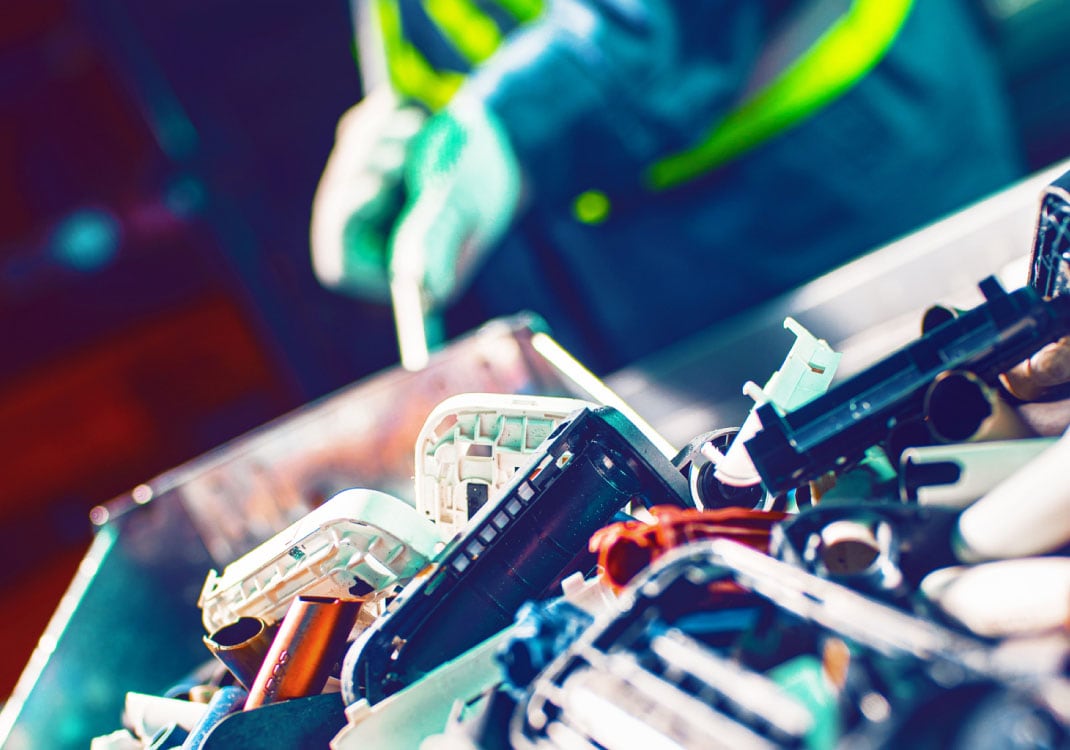PMI is transforming for good. We are striving to accelerate the end of smoking—and have a net positive impact on society in the longer term.
That is why we are actively seeking to reduce the environmental impact of our products and operations, because our vision of a smoke-free future through science and innovation goes hand in hand with a commitment to a more sustainable world. This is enshrined in our Environmental Commitment.
To minimize the waste from our smoke-free consumables, we evaluate the need for a take-back program with every product launch, looking at environmental impact, consumer needs, and market feasibility. Long term, we aim to reduce post-consumer waste by design, and explore low-carbon, recyclable, and biodegradable alternatives to the materials currently used in our smoke-free consumables.
For now, we are focused on doing everything we can to help adult consumers minimize the environmental impact of using our heated tobacco and e-vapor products. This includes:
- Deploying anti-littering programs. We aspire to have at least 80 percent of our shipment volumes covered by markets with anti-littering programs to collect and manage post-consumer waste by the end of 2025.
- Following eco-design and circularity principles for our smoke-free products. We embed circular concepts in the product design and are developing and implementing recycling options.
Deploying anti-littering programs
We know we need to do everything we can to prevent the incorrect disposal of our smoke-free consumables. These include the heated tobacco units (HTUs) used in our heat-not-burn products, and the liquid pods used in our e-vapor device.
As part of the aspirations in our 2025 Roadmap, we are committed to ensuring there are impactful anti-littering programs to collect and manage post-consumer waste in at least 80 percent of markets by the end of 2025. We will report our progress on this annually. We currently have active anti-littering campaigns in 46 countries.
However, we already know consumer behavior around smoke-free products is dramatically different to behavior around cigarettes. HTUs are not lit so do not need to be stubbed out after use, and don’t contain pungent smoke residue, which makes managing their waste easier. Consumers can keep HTUs until proper disposal is possible—therefore making them less likely to be littered.
In 2020, we ran a survey in Lithuania to measure the proportion of HTUs versus cigarette butts found on the ground. The percentage of used HTUs among littered tobacco products was between 2.4 and 4.5 times lower than their market share. This indicates that a heated tobacco unit is, on average, three times less likely to be littered than a cigarette butt.
Introducing take-back and recycling schemes
We want to give as many adult consumers as possible a way to collect and return their used smoke-free consumables for responsible disposal or recycling.
In 2021, we piloted programs in nine countries including Canada, Finland, Guatemala, and Switzerland. These will fuel the rollout of programs globally by the end of 2025.
In Finland, there are collection points for e-vapor pods at 470 locations. We also provide reusable collection pouches.
In Canada, consumers can return their used heated tobacco unit, e-vapor device, and any branded vape pod to more than 120 locations.
And in Mexico, our affiliate launched a hugely successful program for HTUs. Special collection bags were made available to adults at IQOS stores. Used HTUs were then processed using an innovative biotechnological treatment that regenerates cellulose acetate into cellulose pulp. By the end of 2021, more than one in ten adult customers were returning their used consumables to a store.
Our aspiration is for at least 80 percent of our shipment of smoke-free products to go to markets with end-of-life take-back programs in place by 2025.
Following eco-design and circular principles
We are striving to design all our smoke-free products in such a way to avoid, or significantly reduce, waste.
Long term, we aim to reduce post-consumer waste by exploring low-carbon, recyclable, and biodegradable alternatives to the materials currently used in our smoke-free consumables.
By the end of 2025, our ambition is to achieve eco certification for all our smoke-free devices. As well as recycling, we are also pursuing improvements in areas such as durability and design for repair.
We are constantly looking at innovative ways to recycle post-consumer waste. In Costa Rica, the Chemical Regency of the University of Costa Rica has been collecting consumables since December 2021. Various alternatives for recycling are currently under evaluation, including the production of biochar, a soil improvement solution.
Sustainability matters
We know that sustainability for our business means actively reducing the environmental impact of our products.
This is crucial as we continue to develop a range of better alternatives to satisfy the different requirements of current adult smokers who would otherwise continue to smoke.
Only by keeping sustainability at the forefront of our minds, and harnessing the power of science and innovation, can we create a better, smoke-free future.



